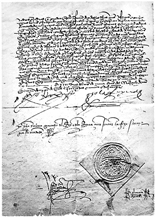Reflections
The Spanish Expulsion
The Spanish Expulsion is remembered as one of the most difficult decrees for the Jewish nation in exile. This decree brought an end to the "Golden Era" of Spain.
The Christians never made peace with the Moslem sovereign on European soil, and in the year 4483/723 battles began against the Moslems to expel them from Spain. Meanwhile the moderate Moslem dominion had been replaced by a more fanatic faction, and once again the Jews knew no rest in Spain. Many Jews moved to Christian countries and some remained in northern Spain in territory that the Christians had succeeded in conquering. The Vatican requested of the Christian rulers in northern Spain that they deal strictly with the Jews living on their land, but the rulers needed the Jews’ help and so granted them relative quiet. In those years the Ramban, the Rashba, and Rabbenu Yona lived in Spain.
On the 3rd of Shevat 5252/1492 the Christians conquered the last Moslem strongholds in Granada, and Spain was now entirely in Christian hands. The goal of the Christian-Catholic dominion was to create a united and homogenous society under the power of the Pope in Rome. In order to achieve this, they established the infamous Spanish Inquisition (5238/1478). The Inquisition opened its evil doors on the 2nd of Shevat 5241/1481, and its main function was to identify any Christian non-believers and arrest them. At the outset the Inquisition did not have the power to arrest a non-Christian, but after a while, when the Christians saw that they had not succeeded in convincing the Jews to become Christians and most had not converted, the Inquisition began to pursue the few Jews who had, to all appearances, converted. They were called ‘New Christians’ and were constantly suspected of observing Judaism in secret. The Christians did not tire of trying to persuade them to leave their religion behind.
In those early days the Christians began to take measures to cause the Jews to convert. The Jews were forced to listen to lengthy sermons from Christian priests, and several edicts were issued against them whose main goal was to isolate the Jews from the general Christian population. After a time the head of the Inquisition, Priest Tomas de Torquemada, succeeded in persuading King Ferdinand and Queen Isabella that the Jews were a bad influence on their brothers who had converted to Christianity, and so they must be expelled from Spain. The king and queen consented and signed the expulsion decree.
On the 3rd of Nissan 5252/1492 the fateful edict was declared throughout Spain. The edict proclaimed that the Jews must leave the country within three months, never to return. In addition it was forbidden for any Spanish Christian to hide Jews in their homes or to help them in any way. The reason for the expulsion, quoting from the words of the decree itself, was: “Know, and you are required to know, that it has become known that in our empire there are several evil Christians who converted to Judaism and betrayed the Holy Catholic religion, and the main reason for this was the association between Jew and Christian. Therefore, at the advice and according to the evidence brought by many of the high and low priestly aristocracy of our kingdom, and other people of knowledge and foresight in our council, and upon great thought, we have hereby agreed to command and expel all Jews and Jewesses from our Kingdom.”
According to the decree, the Jews were given the option to convert or to leave Spain. Those who chose to leave Spain were given three months to sell all their property, and were forbidden to take out any articles of value such as jewelry, silver and gold. They were permitted to take out other property. The last day of those three months fell on Tisha b’Av 5252/1492 (some say that it was the 7th of Av).
It is estimated that the number of Jews expelled from Spain reached close to 300,000. The expellees were scattered over many countries. Some went to Portugal, a neighboring country to Spain, only to be expelled from there a mere five years later. Some Jews turned to France and countries in Northern Africa, whilst others decided to cross the great ocean and make their way to the New World that was recently discovered – America. However, a large majority of the Jews expelled from Spain turned to the regions of the Autonomous Empire, where religious tolerance reigned and it was possible for them to lead full Jewish lives.
The edict forbidding Jews to live in Spain continued for many long years, until it was officially annulled on the 28th of Kislev 5728/1948.






